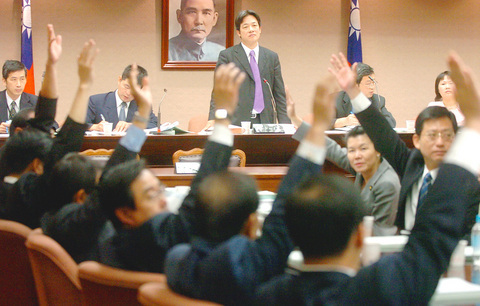The pan-blue dominated Procedure Committee yesterday rejected the Democratic Progressive Party (DPP) caucus' proposal to invite President Chen Shui-bian (陳水扁) to deliver a state of the nation address to the legislature.
The proposed report would focus on the arms procurement bill.
The committee also refused for the 33rd time to place the arms procurement plan on the legislative agenda, as well as the list of Chen's nominees for the Control Yuan.

PHOTO: LUO PEI-TEH, TAIPEI TIMES
DPP caucus whip William Lai (
"To disallow the president to address the legislature is a show of disrespect for the president and a violation of the president's constitutional right," Lai said.
Citing Article 4 of the Organization Act of the Legislature's Procedure Committee (
He also said People First Party (PFP) caucus whip Hwang Yih-jiau (
Lai was referring to a dispute that took place at the committee at noon.
DPP Legislator and committee member Wang To-Far (
"Remember, what you say and do today here will go into the history books," he said.
DPP Legislator Cheng Yun-peng (
To show his support for Cheng, DPP Legislator Wu Bing-ray (吳秉叡) said that although he personally opposed amendments to the Law Governing Legislators' Exercise of Power (立法院職權行使法) proposed by the Chinese Nationalist Party (KMT) caucus, he would not propose to delay it.
Pan-blue lawmakers, however, still proposed to block the arms procurement plan and Chen's nominees for the Control Yuan, as well as 16 other bills proposed by the DPP and its ally, the Taiwan Solidarity Union (TSU).
The two camps then launched into a debate over whether the Procedure Committee has the right to block bills that have completed due procedure.
Realizing that the debate was going nowhere, Hwang and KMT Legislator Tseng Yung-chuan (曾永權), who also serves as the executive director of the party's Central Policy Committee, proposed to put the issue to a vote.
The pan-blue dominated committee voted 18 to 12 to stop the discussion and vote on committee members' proposals to defer certain bills.
Stakked bills
Major DPP bills that have been obstructed by the Procedure Committee since the beginning of the sixth legislative term in February
1. Invite President Chen Shio-bian to deliver a state of the nation address focusing on the arms procurement plan: Blocked once
2. Arms procurement plan: Blocked 33 times
3. Amendments to the State-Owned Properties Law (國有財產法): Blocked 17 times
4. Confirmation of President Chen Shui-bian’s nominees for the Control Yuan: Blocked 15 times
5. Amendments to the Referendum Law (公民投票法): Blocked 7 times
6. Bill governing the survey and disposition of assets and properties of political parties and their affiliates: Blocked 7 times
7. Administrative corporation bill (行政法人法): Blocked 7 times
8. Amendments to the Immigration Law (入出國及移民法): Blocked 7 times
9. Homeland restoration act (國土復育條例): Blocked 7 times

Chinese Nationalist Party (KMT) Chairman Eric Chu (朱立倫), spokeswoman Yang Chih-yu (楊智伃) and Legislator Hsieh Lung-chieh (謝龍介) would be summoned by police for questioning for leading an illegal assembly on Thursday evening last week, Minister of the Interior Liu Shyh-fang (劉世芳) said today. The three KMT officials led an assembly outside the Taipei City Prosecutors’ Office, a restricted area where public assembly is not allowed, protesting the questioning of several KMT staff and searches of KMT headquarters and offices in a recall petition forgery case. Chu, Yang and Hsieh are all suspected of contravening the Assembly and Parade Act (集會遊行法) by holding

PRAISE: Japanese visitor Takashi Kubota said the Taiwanese temple architecture images showcased in the AI Art Gallery were the most impressive displays he saw Taiwan does not have an official pavilion at the World Expo in Osaka, Japan, because of its diplomatic predicament, but the government-backed Tech World pavilion is drawing interest with its unique recreations of works by Taiwanese artists. The pavilion features an artificial intelligence (AI)-based art gallery showcasing works of famous Taiwanese artists from the Japanese colonial period using innovative technologies. Among its main simulated displays are Eastern gouache paintings by Chen Chin (陳進), Lin Yu-shan (林玉山) and Kuo Hsueh-hu (郭雪湖), who were the three young Taiwanese painters selected for the East Asian Painting exhibition in 1927. Gouache is a water-based

Taiwan would welcome the return of Honduras as a diplomatic ally if its next president decides to make such a move, Minister of Foreign Affairs Lin Chia-lung (林佳龍) said yesterday. “Of course, we would welcome Honduras if they want to restore diplomatic ties with Taiwan after their elections,” Lin said at a meeting of the legislature’s Foreign Affairs and National Defense Committee, when asked to comment on statements made by two of the three Honduran presidential candidates during the presidential campaign in the Central American country. Taiwan is paying close attention to the region as a whole in the wake of a

OFF-TARGET: More than 30,000 participants were expected to take part in the Games next month, but only 6,550 foreign and 19,400 Taiwanese athletes have registered Taipei city councilors yesterday blasted the organizers of next month’s World Masters Games over sudden timetable and venue changes, which they said have caused thousands of participants to back out of the international sporting event, among other organizational issues. They also cited visa delays and political interference by China as reasons many foreign athletes are requesting refunds for the event, to be held from May 17 to 30. Jointly organized by the Taipei and New Taipei City governments, the games have been rocked by numerous controversies since preparations began in 2020. Taipei City Councilor Lin Yen-feng (林延鳳) said yesterday that new measures by